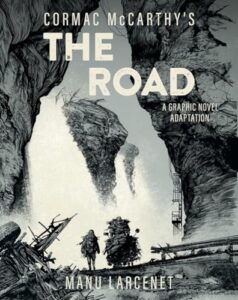When the lovely publicist at Abrams Comics pitched this graphic novel adaptation to me, I made him laugh by replying, “I’ll be honest: I desperately hated The Road but am wildly curious to see what Manu Larcenet brings to the story. He can’t make it worse!” You can read my original review of the source material here, and an even more accurate examination of it by another critic I admire here. And no, we’re not being contrarian: that Emperor genuinely has no clothes!
 Even so, I love a good graphic novel, and was super happy to crack open this volume. Because a lot of times, even when I hate an author’s writing, I can recognize that there’s still a pretty great story hiding inside the irritating mannerisms. Stripped of Cormac McCarthy’s tedious prose style, I wanted to see whether the plot still worked as entertainment — nvm the issues with narcissism, allegory and genre that I’ll get to briefly later on in this review.
Even so, I love a good graphic novel, and was super happy to crack open this volume. Because a lot of times, even when I hate an author’s writing, I can recognize that there’s still a pretty great story hiding inside the irritating mannerisms. Stripped of Cormac McCarthy’s tedious prose style, I wanted to see whether the plot still worked as entertainment — nvm the issues with narcissism, allegory and genre that I’ll get to briefly later on in this review.
To my immense relief, Manu Larcenet knocks it out of the park with this graphic adaptation. I do admit that I didn’t recognize the ending as being the same as it is in the novel, but that could also be because I was rolling my eyes too hard to remember all the details back when I was reading the original in 2011. I have no doubt that Mr Larcenet was absolutely faithful in this telling, a commitment underscored by the passionate and illuminating letter he included at the end of this volume. He wrote it as a pitch to Mr McCarthy, and begins by talking about how much he loves the atmosphere of the book and the ways he enjoys drawing the contrasts it portrays. All he wants to do with his proposed graphic adaptation, he says, is to draw Mr McCarthy’s words.
And thank fuck for that. By substituting in a glorious art of the afore-mentioned contrasts, this graphic novel strips nearly all of the ridiculous prose style from the story and allows the grand horrors of a desperate trek for survival to really come to the fore. Mr Larcenet contrasts bright ads and colorful preserved goods from the before times with post-apocalyptic ashfall and the decay of unmaintained, often looted property; the beauties and terrors of nature bright in tooth and claw with the foul perversions of people only ever termed “the bad guys”. And the use of colors! While the palettes were not strictly keyed to individual characters or moods as I’d half expected at the beginning of the book, they served almost as a soundtrack that I could actually hear as the book progressed. Combining this with the detailed linework and excellent use of erasure makes for a visually stunning graphic novel.
Most interestingly and endearingly to me as a reader — and I don’t know if this was a deliberate choice or something that just happens when you refocus the story to visuals and atmosphere instead of atrocious dialog or, worse, self-pitying interior bullshit — is the way the worst excesses of the source material are toned down. In my original review of The Road, I said how it bothered me that this story was written with the father not as the protagonist but as The Hero:
[I]t bugged me that the father’s desire to see his son survive became, implicitly, more about the father’s desire than the son’s survival.
Because we aren’t subject to Mr McCarthy’s weird compulsion to excuse any bad parenting with the novelistic version of “it’s the thought that counts and if it were a real emergency, I would totally sacrifice everything for you, but it’s not so why don’t you appreciate me more”, it’s easier to appreciate the story for what it’s striving to be, a tale of parental love despite the odds. And that’s a genuinely touching premise, even if the original author’s literary excesses meant that his book was at best middling genre fiction, and at worst self-excusing torture porn that uses the mantle of post-modernism to avoid anything like world-building or social commentary outside of the immediate father-son dynamic.
One reason I will never be against adaptations, particularly in this modern age (but also shoutout to all the Illustrated Classics writers and creators over the years who turned some truly impenetrable if not outright poorly written books into thrilling adventures and moving tales,) is that the adaptor’s eye is often so good at winnowing out the nourishing from the chaff. Mr Larcenet has done exactly that, preserving and highlighting all that is good about Cormac McCarthy’s The Road while getting rid of so much of the rubbish.
Cormac McCarthy’s The Road by Manu Larcenet was published September 17 2024 by Abrams Comicarts and is available from all good booksellers, including

2 comments
1 ping
This is a great review!
Author
Haha, thank you! Not a lot of books annoy me but the source material here did, and I’m so glad Manu Larcenet made it so amazing.
[…] read and deeply enjoyed Manu Larcenet’s graphic novel adaptation of a book I loathed, Cormac McCarthy’s The Road. Could the acclaimed trio of illustrators here do the same for my opinion of Mr Auster’s […]